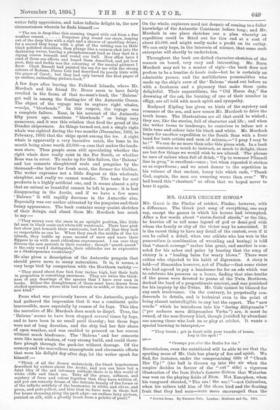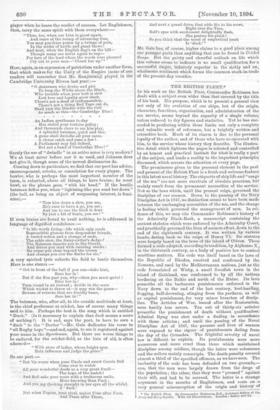MR. GALE'S CRICKET SONGS.*
Mn, GALE is the Pinder of cricket, Pindar, however, with a difference. The Greek poet sang of everything, one may say, except the games in which his heroes had triumphed. After a few words about "storm-footed steeds," or the like, he hurries off to tell some legend of god or demi-god with whom the family or city of the victor may be associated. It is the rarest thing to have any detail of the contest, even if it can be called a detail, when one athlete who has won in the pancratium (a combination of wrestling and boxing) is told that "stanch courage" makes him great, and another is con- soled for his aches and pains by hearing that the song of victory is a "healing balm for weary blows." There were critics who objected to his habit of digression. A story is told—of Simonides however, not of Pindar—that some victor. who had agreed to pay a handsome fee for an ode which was to celebrate his prowess as a boxer, finding that nine-tenths of the poem were devoted to praise of the Twin Brethren, docked the bard of a proportionate amount, and was punished for his impiety by the Twins. Mr. Gale cannot be blamed for any such irrelevance. On the contrary, he perpetually con- descends to details, and is technical even to the point of being almost unintelligible to any but the expert. The "new words" which he introduces into his "daring dithyrambs" (" per audaees nova dithyrambos Verba ") are, it must be owned, of the non-literary kind, though justified by abundant use among those who look on or play at cricket. It wants a special learning to interpret,— " They break ; gat in front with your bundle of bones,
Leg is the spot ! "
" Crumps you o'er the Baths for six."
Nevertheless, even the uninitiated will be able to see that the sporting muse of Mr. Gale has plenty of fire and spirit. We find, for instance, under the compromising title of "Chuck Her Up !" (the ball is thrown up into the air when the umpire decides in favour of the "out" side) a vigorous illustration of the Iron Duke's famous dictum that Waterloo was won on the playing fields of Eton. Not Xenophon, when his vanguard shouted, "The seal the sea ! "—not Columbus, when his sailors told him of the shore bird and the floating fruit that they had seen—were more encouraged than the
! Cricket Songs. By Norman Gale, London: Methuen and Co, 1894. or-
player when he hears the verdict of success. Let Englishmen, then, carry the same spirit with them everywhere :—
"Thus, too, when our Lion is great again,
And roars at the tramp of advancing foes, You may purchase praise by a twinge of pain, In the midst of battle and giant blows !
And next, when the English flag's on the hill— Though many are never again to sup—
For love of the land where the words were planned Cry out to your men—' Chuck her up."
here, again, is an expression of patriotism under another form, that which makes for the Unity of the Empire (some of our readers will remember that Mr. Ranjitsinhji played in the Cambridge University Eleven last year) :—
"0 statesmen who devise and plot
To keep the White above the Black, Who tremble when your bolt is shot Lest love and loyalty grow slack. There's not a deed of craftsmanship, There's not a thing Red Tape can do, Shall knit the Hindoo with the Celt As much as this—the Cambridge Blue !
. . .....
An Indian gentleman to-day Has staled your tortoise policy; And thousands cheer to see him play, A splendid batsman, quick and free. A game shall dwindle all your cares.
A clever catch and runs a few !
A. Parliament may fail indeed, But not a band of Cambridge Blue !"
Surely the use of " dwindle " in an active sense is very modern? We at least never before saw it so used, and Johnson does not give it, though some of the newest dictionaries do. Coming down to particulars, we find that our poet has advice,
encouragement, rebuke, or consolation for every player. The bowler, who is perhaps the most important member of the team, is exhorted, above all things, to have brains ; he must bowl, as the phrase goes, "with his head." If the hostile batsman defies you, when "lightning-like you send her down" (the ball, as being an object of surpassing interest, is femi- nine),—
" Toss him down a slow, you see, He's sure to have a go, you see ; And ten to one the trick is done By just a bit of brain, you see ! "
If even brains are found to avail nothing, he is addressed in Language of dignified condolence :—
" Is life worth living—life which only sends Reproachful glances from despondent friends, A varied action and a change of ends, The sable slow, the Daisy-cutter's dodge ? The Batsman smacks you to the Courts, And drives you mad with cunning snicks ; He wipes you clear beyond the screen And cramps you o'er the Baths for six."
A. very spirited lyric exhorts the field to bestir themselves. here is one stanza :—
"Get in front of the ball if you can—take hint,
Buzz her in !
But if she flies past you, why—then you must sprint !
Buzz her in I Turn round in an instant ; decide in the same
Which wicket to throw at—it may win the game—
Beware of returns that are timidly tame, Buzz her in!"
The batsman, who, after all, to the outside multitude at least, is the chief performer at cricket, has of course many things said to him. Perhaps the best is the song which is entitled "Duck." (Is it necessary to explain that duck means a score of nothing?) It is sad, says the poet, to have to own a "duck" to the "Doctor "—Mr. Gale dedicates his verse to "all Rugby boys "—and sad, again, to see it registered against your name in the Sportsman. But there are worse things to be endured, for the cricket-field, as the lists of old, is often adorned—
"With store of ladies, whose bright eyes Rain influence and judge the prize.'
So our poet :— "But 'tis worse when your Uncle and sweet Cousin Bell
Come over to watch
All your wonderful deeds as a very great Swell—
The hope of the match! And Bell asks your score with a traitorous smile, More knowing than Puck ; And you say (looking straight in her eyes all the while), A duck,' But when Fogson, your rival, makes Four after Four, And Three after Three, And next a grand drive, that adds Sit to his score, Right over the Tree, Bell's eyes with excitement delightedly flash, She praises his pluck ! So you think that the worst of emphatical trash Is 'duck.'"
Mr. Gale has, of course, higher claims to a good place among our younger poets than anything that can be found in Cricket Songs. But the gaiety and cheerful outlook on life which this volume seems to indicate is no small qualification for a successful singer, infinitely superior to the sickly and un.
wholesome sentiment which forms the common stock-in-trade of the present-day versifier.







































 Previous page
Previous page